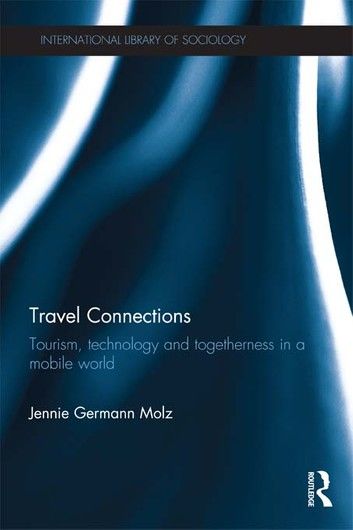| FindBook |
有 1 項符合
Travel Connections的圖書 |
 |
Travel Connections 作者:Jennie Germann Molz 出版社:Taylor & Francis 出版日期:2012-08-06 語言:英文 |
| 圖書館借閱 |
| 國家圖書館 | 全國圖書書目資訊網 | 國立公共資訊圖書館 | 電子書服務平台 | MetaCat 跨館整合查詢 |
| 臺北市立圖書館 | 新北市立圖書館 | 基隆市公共圖書館 | 桃園市立圖書館 | 新竹縣公共圖書館 |
| 苗栗縣立圖書館 | 臺中市立圖書館 | 彰化縣公共圖書館 | 南投縣文化局 | 雲林縣公共圖書館 |
| 嘉義縣圖書館 | 臺南市立圖書館 | 高雄市立圖書館 | 屏東縣公共圖書館 | 宜蘭縣公共圖書館 |
| 花蓮縣文化局 | 臺東縣文化處 |
|
|
Living in a world that is increasingly ‘on the move’ means that many of us now rely on mobile devices, social media, and networking technologies to coordinate togetherness with our social networks even when we are apart. Nowhere is this phenomenon more evident than in the emerging practices of ‘interactive travel’. Today’s travellers are more likely than ever to pack a laptop or a mobile phone and to use these devices to stay in touch with friends and family members – as well as to connect with strangers and other travellers – while they are on the road. New practices such as location-aware navigating, travel blogging, flashpacking and Couchsurfing now shape the way travellers engage with each other, with their social networks, and with the world around them.
Travel Connections prompts a rethinking of the key paradigms in tourism studies in the digital age. Interactive travel calls into question longstanding tourism concepts such as landscape, the tourist gaze, hospitality, authenticity and escape. The book proposes a range of new concepts to describe the way tourists inhabit the world and engage with their social networks in the twenty-first century: smart tourism, the mediated gaze, mobile conviviality, re-enchantment and embrace.
Based on intensive fieldwork with interactive travellers, Travel Connections offers a detailed account of this emerging phenomenon and uncovers the new forms of mediated and face-to-face togetherness that become possible in a mobile world. This book will be of interest to students and scholars of sociology, tourism and hospitality, new media, cosmopolitanism studies, mobility studies and cultural studies.
|










